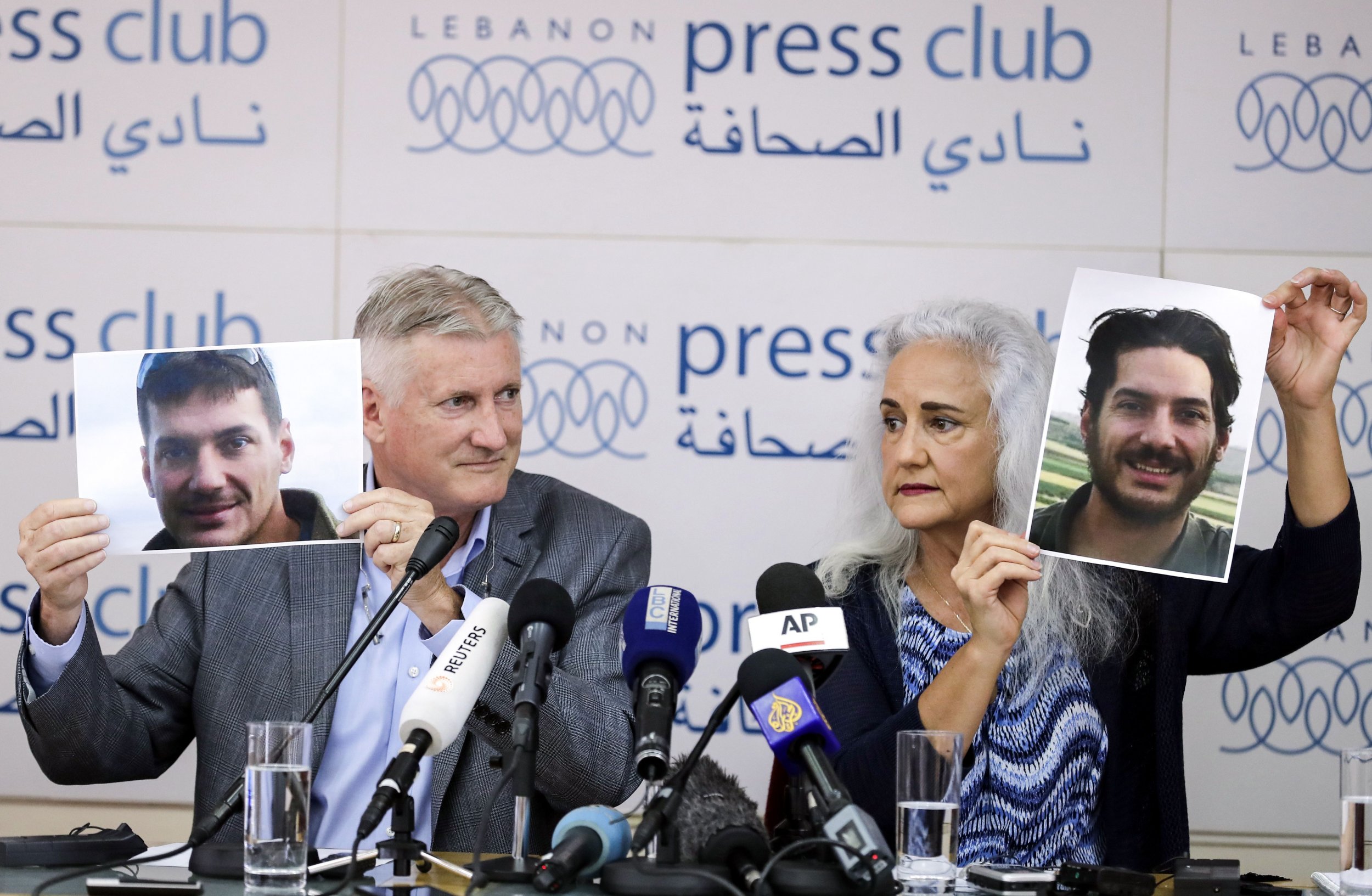
Four years ago today, American journalist James Foley was killed by ISIS militants. Held captive since 2012, Foley was one of several journalists—including a handful of Americans—who met their deaths at the hands of ISIS executioners.
Today, at least one American is still missing in Syria. Austin Tice has not been heard from since he disappeared in 2012. The FBI has offered a $1 million reward for information leading to his safe recovery, but Tice's fate remains unknown.
Foley's death sent shockwaves through American media and society. In the video of his death, the executioner blames the first American airstrikes on ISIS targets in Iraq on August 8, 2014, ordered by President Barack Obama, warning that repeated action would lead to more U.S. bloodshed.

Before his death, Foley read a forced statement lamenting U.S. action against ISIS, accusing the American government of being responsible for his death. He was the first American citizen killed by ISIS, joined by fellow U.S. journalist Steven Sotloff just weeks later.
The sad anniversary of his death draws light onto Tice's continued absence. The freelance reporter and former Marine went missing at a checkpoint in the Damascus suburb of Darayya on August 14, 2012, three days after his 31st birthday. He had been due to leave Syria just days later.
Around five weeks after he disappeared, a video emerged showing Tice being held blindfolded by unidentified armed men. There was no information with the video, only a title that declared "Austin Tice Still Alive."
It has never emerged who was behind the abduction, though the CIA has reportedly tried to set up a backchannel to the Syrian government to secure his release, according to the New York Times. As such, it is possible that the regime of President Bashar al-Assad or a militant group aligned with him may still be holding the American.
In an article by Vanity Fair, some have suggested Tice could be being held somewhere in Damascus, perhaps at a "foreigners' complex" designed especially for non-Syrian journalists. The regime has denied holding the journalist, though the same could be said for thousands of people who have disappeared while in government jails since 2011.
Earlier this week, Tice's parents marked the sixth anniversary of his disappearance with a press conference once again calling for his release. Marc and Debra Tice said they still believe their son to be alive, stuck somewhere in Syria amid the chaos of civil war. "It seems like, in many ways, the time has gone so quickly, but we know that, for Austin, it must be grinding on," Debra said.
At least five other journalists remain missing in Syria, while another 122 have been confirmed dead since 2011, the Committee to Protect Journalists said. Just weeks after Foley's death, Soltoff was also beheaded in the Syrian desert.
Another American, Kayla Mueller, also died while being held captive by ISIS. She had been providing humanitarian aid in Aleppo when she was seized in August 2013. She was held prisoner and allegedly forcibly married to ISIS leader Abu Bakr al-Baghdadi, who abused and tortured her. Mueller was killed in early 2015, supposedly by a Jordanian airstrike on ISIS positions.
Other captives have been luckier, and a handful have been released or escaped from different militant groups. Photographer Matthew Schrier was kidnapped by Jabhat al-Nusra—the Al-Qaeda affiliate in Syria—in December 2012. He managed to escape in July 2013, squeezing out of a small window. American Peter Theo Curtis, with whom Schrier was imprisoned, was released by the group in 2014.
Schrier told Newsweek he thinks Tice could still be alive. "We haven't seen any proof, any body," he explained. He added that the video showing Tice post-capture "was a total farce. There was nowhere to bury him, if you look at it they're in an area of rocks. It was a total sham." Others have been equally skeptical of the footage, some suggesting the video was staged to appear as if an Islamist group was holding the journalist, rather than the Syrian regime.
"Until I see a body, I'm with the Tices, and I'm going to keep the faith alive. I think it is more likely that he is alive than dead," Schrier said. After all, everyone expected the worst when Schrier himself was held captive. "When I came home, everyone thought I was dead. And then I just popped up," he recalled. "It's important that people remember him and raise awareness that there is still somebody out there."

As to how he managed to endure seven months as a prisoner, Schrier said he used humor to build a rapport with his jailers, while remaining mentally stubborn about his survival. Even before his successful escape, he made countless attempts at regaining his freedom. "I was always trying, I never stopped thinking about it," he said. "I never let myself think that I was going to die there, I always thought I was going to live. I knew the chances were against me but I always remained positive and confident."
"That's a huge factor," Schrier explained. "It doesn't matter if you're a Christian, a Jew, a Muslim, an atheist—you have to have faith. You have to keep going."
As the Tice family begin another year of uncertainty, reporters asked Marc how the couple remained optimistic given the task facing them. "Well, we know he's alive, and we're sure he wants to come home," he explained.
President Donald Trump has been successful in arranging hostage returns from Venezuela, North Korea and Egypt. The Tices have expressed their thanks for the administration's efforts to free their son, describing its commitment to the project as "really gung-ho." And as Schrier said: "Trump, for all his faults and flaws, has brought home more hostages than anybody in decades in just a year and a half. That's a positive thing right there, that gives hope."
Uncommon Knowledge
Newsweek is committed to challenging conventional wisdom and finding connections in the search for common ground.
Newsweek is committed to challenging conventional wisdom and finding connections in the search for common ground.
About the writer
David Brennan is Newsweek's Diplomatic Correspondent covering world politics and conflicts from London with a focus on NATO, the European ... Read more
To read how Newsweek uses AI as a newsroom tool, Click here.








